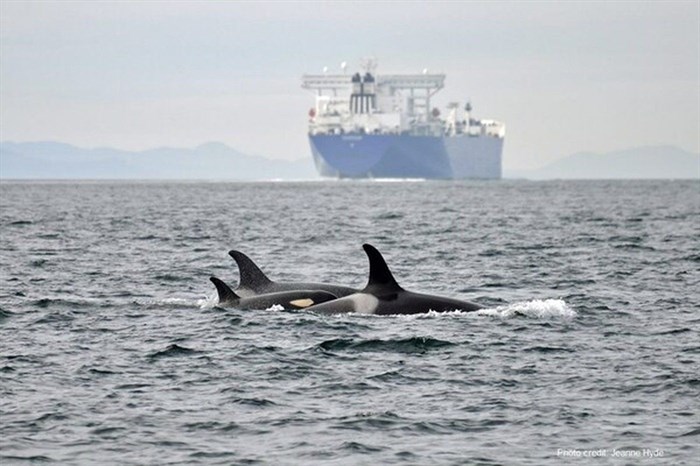
Killer whales traveling nearby a ship off the coast of British Columbia.
Image Credit: (CNW Group/Vancouver Fraser Port Authority)
February 24, 2024 - 4:30 PM
Canada has the chance to turn the tide on a perilous kind of pollution threatening marine life along all its coasts, conservation groups say.
Underwater noise from human activity continues to surge in Canada’s oceans, creating an acoustic smog with harmful and even lethal impacts for a wide range of species, from microscopic plankton to great whales.
Chronic underwater noise from shipping, deafening blasts from pile driving for shoreline construction and marine seismic surveys in oil and gas exploration can displace whales and other sea life from critical habitats, disrupt their ability to feed, communicate or navigate and cause stress, permanent injury and even death, said Hussein Alidina, WWF-Canada’s lead specialist for marine conservation.
Canada’s ocean noise strategy, originally promised in 2022, is long overdue, Alidina said.
It’s urgent the federal government chart out immediate, meaningful and measurable actions to protect whales and other important sea life in increasingly clamourous seas, particularly where rising noise and activity intersect with biodiversity hot spots, he said.
Vessel traffic and shipping along Canada’s maritime corridors, which is the greatest source of noise, is already heavy on the West Coast in the Salish Sea and in the St. Lawrence corridor in Eastern Canada, Alidina said.
But as Arctic ice continues to shrink, noise from shipping and other industrial activity will ratchet up sound levels in a previously silent ocean ecosystem sheltering important species like belugas, narwhals, walrus and bowhead whales, he said.
And B.C.’s formerly tranquil northern coast is also set to see a swell in shipping along marine corridors regularly frequented by at-risk populations of orcas, humpback and fin whales as a number of new liquified natural gas (LNG) export projects come online.
Underwater noise pollution from global shipping is expected to double, on average, every 11.5 years. Ships’ propellers are responsible for the majority of noise from vessels. The sound of a propeller can reach 170 decibels — akin to a jet engine or a rocket liftoff.
It’s urgent that Ottawa set noise limits to prevent harm to marine life from activities like shipping or industrial activity, especially to keep a lid on the problem in previously silent areas that are going to see a rise in activity, Alidina said.
Targets to reduce noise are needed in areas like the Salish Sea, which are already way too loud and only expected to become louder, he added.
Oil tanker traffic to Trans Mountain’s Westridge Marine Terminal in Burnaby, B.C., is expected to spike when the delayed and over-budget pipeline is expected to be done in the first financial quarter of this year.
New berths at the terminal will load approximately 34 tankers a month, up from an average of five vessels, according to Trans Mountain.
And more noise is expected with the contentious Roberts Bank terminal expansion that will double the capacity of the Port of Vancouver and the Westshore facility, near Delta, B.C. It’s slated for completion by the middle of the next decade.
Vessel noise already significantly impacts endangered southern resident killer whales, which use echolocation to hunt chinook salmon, which are also in decline, by hindering their communication with one another and their ability to find food.
Unlike many other types of marine pollution that can be complicated to prevent or remedy, there are readily available fixes that can have immediate positive effects, Alidina said.
In tandem with setting noise thresholds, the federal government can offer incentives for industry and companies to develop and adapt quieter technology or retrofit ships with quieter propellers, he said.
And the lowest hanging fruit is to simply mandate ships to slow down in heavy traffic areas with high impacts on marine life, he said.
Slowing ships down to 10 knots or lower has a triple benefit. It not only dramatically reduces noise but also reduces emissions and the risk of whales being hit. A speed reduction of 10 per cent across the globe’s shipping fleet could reduce greenhouse gas emissions by an estimated 13 per cent, drop underwater noise pollution by 40 per cent and lessen the risk of vessels striking whales by nearly half, research suggests.
The Canadian government has already imposed a mix of seasonal, voluntary and mandated slowdown measures to protect endangered southern resident killer whales in pockets of the Salish Sea and North Atlantic right whales and belugas in the St. Lawrence.
And the Port of Vancouver’s ECHO Program — which includes numerous groups and private sector firms collaborating to find ways to voluntarily mitigate the impacts of vessel traffic on the endangered orcas — is largely viewed as a success that should be replicated and widened, Alidina said.
Slowdowns or distancing measures by nearly 90 per cent of large vessel operators in port authority areas critical to southern resident killer whales dropped underwater noise by half, reduced the danger of ship strikes by a third and lowered emissions, according to the Vancouver Fraser Port Authority.
A similar initiative south of the border called Quiet Sound was launched recently to replicate the success of ECHO, he added.
The federal government needs to broaden its patchwork and limited response that, to date, is narrowly focused only on a few endangered whale populations despite underwater noise being a wide ecosystem threat, Alidina said.
“There’s generally lots of awareness and goodwill, particularly from noise emitters, around this issue,” he said.
“The question is, ‘How quickly can we move towards doing something?’”
— This story was originally published by Canada’s National Observer.
News from © iNFOnews, 2024